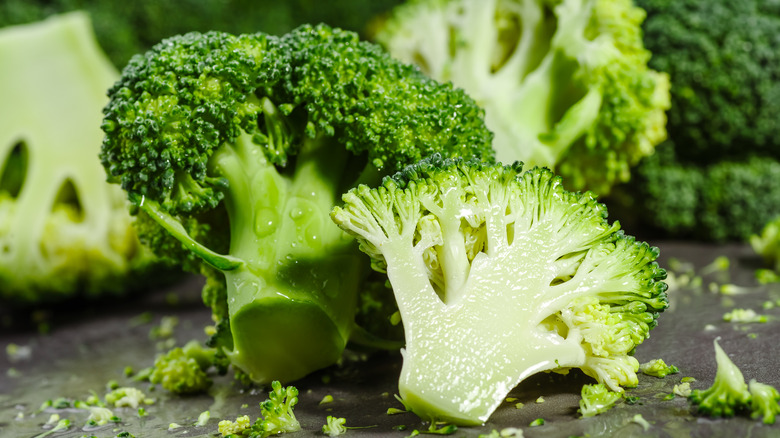
Broccoli is renowned as a superfood, packed with vitamins and antioxidants. Similar to cabbage, kale, and other cruciferous vegetables, it offers substantial nutritional benefits and complements various diets. According to My Food Data, a single serving (5.2 ounces) contains just 50 calories and provides over 4 grams of plant-based protein. Additionally, it delivers 9.8 grams of carbohydrates, including nearly 4 grams of fiber, along with significant amounts of vitamin C, calcium, phosphorus, potassium, and folate. The antioxidants in broccoli, such as vitamin A, lycopene, lutein, and zeaxanthin, help combat free radicals and bolster your body’s defenses.
For instance, lutein and zeaxanthin are known to promote eye health and may reduce the risk of cataracts, as stated by the American Optometric Association. Vitamin C, a key nutrient in broccoli, may also slow the progression of age-related macular degeneration, a condition that leads to blurred vision. Furthermore, broccoli is an excellent source of sulforaphane, indole-3-carbinol, flavonoids, and other bioactive compounds with antioxidant and anti-inflammatory properties, according to a 2014 study published in Preventive Nutrition and Food Science.
However, while it might be tempting to include broccoli in your daily diet, it’s important to remember that more isn’t always better. Despite being a nutritional powerhouse, certain compounds in this cruciferous vegetable can negatively impact your health if consumed excessively.
Eating too much broccoli could affect thyroid function

Cruciferous vegetables, such as broccoli, contain thiocyanate, progoitrin, and other compounds that could impact thyroid health. These naturally occurring chemicals may hinder iodine absorption, thereby reducing thyroid hormone production, according to research in Nutrition Reviews. Consuming broccoli or other cruciferous vegetables in excess may increase the risk of hypothyroidism, a condition characterized by unintended weight gain, depression, fatigue, joint pain, and muscle aches, as noted by WebMD.
Nonetheless, these side effects are unlikely to result from typical serving sizes of broccoli, collard greens, bok choy, cabbage, and other vegetables in the brassica family. Moreover, cooking reduces the concentrations of glucosinolates, such as thiocyanate, as reported in an earlier study in Human Toxicology. Therefore, steaming, boiling, roasting, or grilling broccoli can activate myrosinase, an enzyme that neutralizes these compounds.
The downside is that many vegetables lose valuable nutrients when exposed to heat, according to the U.S. Department of Agriculture. Folate, thiamin, vitamin B6, vitamin C, and copper are particularly vulnerable to degradation, especially when cooked in water. WebMD reports that microwaving broccoli in water for five minutes can result in a loss of up to 97% of three key antioxidants, whereas steaming has negligible effects on its nutritional value.
Broccoli can cause digestive discomfort

Have you ever felt gas, bloating, or stomach pain after consuming broccoli? Many vegetables in the brassica family can cause digestive discomfort due to their high fiber content, as noted by WebMD. Experts at Duke University caution that high-fiber diets are often responsible for diarrhea or constipation, cramping, and reduced appetite. Furthermore, an excessive intake of fiber can lead to mineral deficiencies.
As previously mentioned, broccoli contains nearly 4 grams of fiber per serving. Consuming 5–6 servings daily translates to an additional 20 to 24 grams of fiber. Duke University points out that the recommended daily intake is 25 grams for women and 38 grams for men. Depending on your dietary habits, it can be relatively easy to consume too much fiber. To avoid this, monitor your portions and gradually increase your fiber intake.
Additionally, excessive broccoli consumption can interfere with warfarin and other blood thinners, as reported by the Cleveland Clinic. Rich in vitamin K, a nutrient that promotes blood clotting, this cruciferous vegetable shares this trait with kale, spinach, collard greens, Swiss chard, and parsley. If you’re taking blood thinners, you can still enjoy these foods in moderation.




